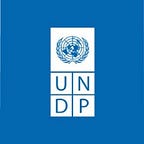A tale of two families keeping tradition alive in the ‘City of Crafts’
Shaki is known as the ‘the city of crafts’ for good reason. For centuries, this city in the north-west of Azerbaijan has been home to artists, craftspeople and merchants plying their skills and trades in the production and selling of headscarves (kelaghayi), silk carpets, painting, wood carving, ceramics and coppersmithery.
The Ahmadov family have been producing and selling handicrafts in Shaki for generations, and brothers Parviz and Sahib Ahmadov are determined to keep these city traditions alive.
Parviz, 34, runs the family business producing wooden handicrafts and souvenirs, working with his brother Sahib, an artist.
The brothers and their families live in a big old house with their mother, who is the head of the family.
“Parviz has always been focused on keeping the family business going and giving back to the community,” says his brother Sahib.
When he found out about the EU-funded project being implemented in the region by UNDP and ABAD to help expand small businesses, Parviz was quick to apply to take the courses and apply for a grant to formalise and expand the family business.
Soon becoming one of the most active participants in the project, Parviz shared his design ideas with the other trainees. “Art is about sharing, not competition,” he says, “the only competition should be healthy competition — between skills, not monopolies.”
With the support provided by the project, Parviz opened a bank account and registered as a souvenir producer with an official tax number to legalise the family business.
Since completing the training and grant application process, the Ahmadov family have since signed a contract with ABAD.
Parviz continues to contribute to the project efforts, sharing his design ideas with other artists and organising art courses for local children.
The ultimate aim of Parviz and his family is to open a small shop in Sheki.
Another family in Sheki striving to make a livelihood in this ‘city of crafts’ are the Ibrahimovs, who were internally displaced from the Kalbajar region and have been putting down roots in Sheki for over twenty years.
Fazila İbrahimova, who lives in Chalabi Khan settlement for internally displaced people with her two sons, her daughter-in-law and their beloved cat, is the head of both the family and the household.
Prior to joining the project, the family’s main source of income comes from the sale of chickens and geese they raised in their backyards.
Having been taught how to weave carpets when she was growing up in Kalbajar, Fazila has never forgotten these skills. Before joining the project, however, she never imagined she could earn a living from this art.
The Ibrahimovs completed several courses offered by the project, including technical courses conducted by professional weavers end experts in marketing local products.
On completing the course, the family successfully applied for the equipment they needed to expand, including carpet looms, tools, souvenir designs and raw materials.
Working with her daughter-in-law, Fazila has already succeeded in drawing a contract with selling household-produced souvenirs through ABAD orders.
“I think customers from all over the world will come to love the carpet-weaving traditions of this region,” Fazila says. “If we can apply what we’ve learnt about business, we will succeed in making people see the beauty in Kalbajar weaving.”
***
The “Support to the Development of Small Family Businesses in the Sheki-Zaqatala Economic Zone through the ABAD Regional Centre in Balakan” project is funded by the EU and co-funded and implemented by UNDP and the ABAD State Agency for Public Services and Social Innovations. The project aims to support 44 rural families to start up and expand their own local businesses, providing them with training in business development and planning, branding and design, financial accounting and legal assistance services. The project also provides beneficiaries with the equipment they need to expand.
